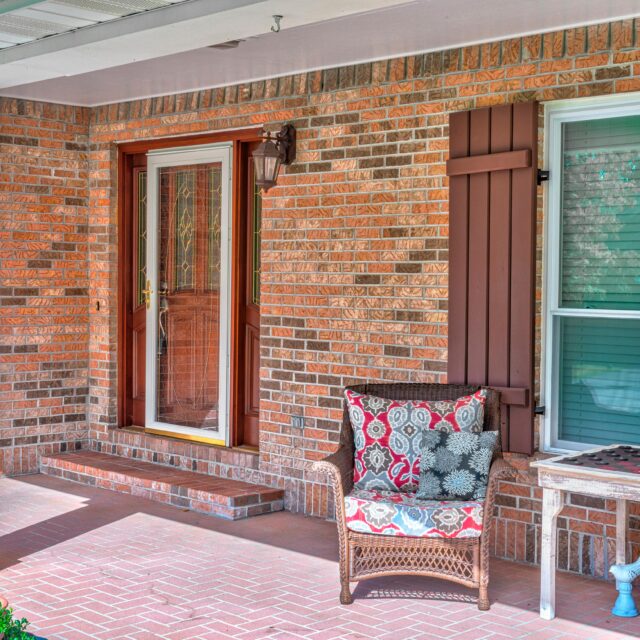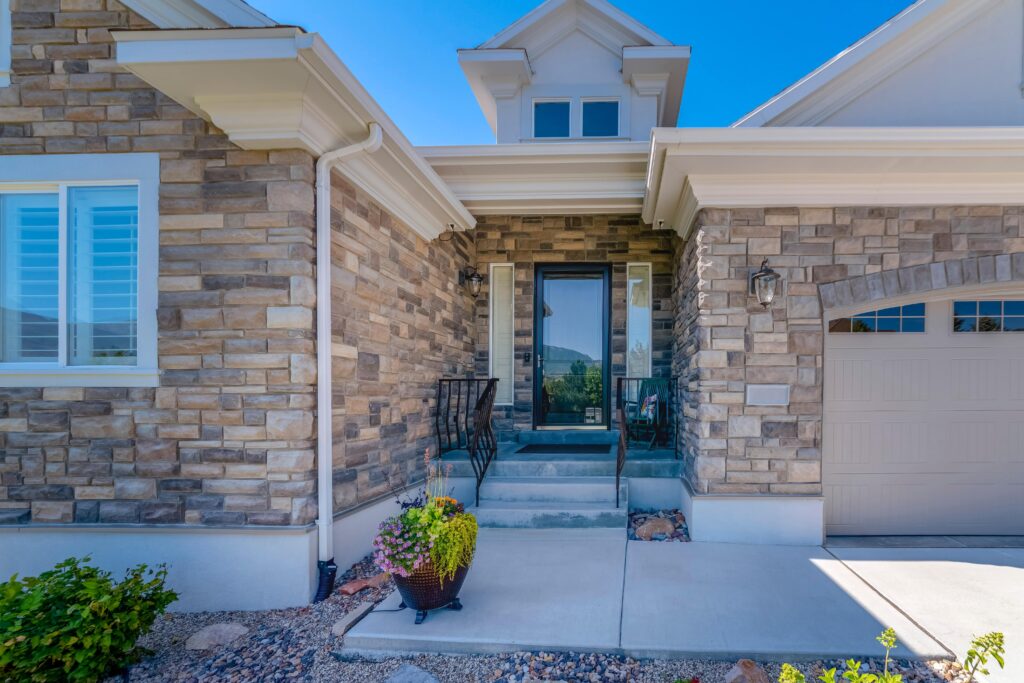What You Need to Know About Storm Doors

- Written by: jlbmdev

For many homeowners, the entry door acts as the focal point of a home’s curb appeal. However, there exists an overlooked but equally important feature—storm doors.
Often unnoticed, the correct storm door offers surprising benefits that can significantly enhance your home’s comfort, efficiency, and curb appeal. It could also help you when you go to resell your home. Whether you’re a seasoned homeowner or a first-time buyer, this comprehensive guide will equip you with the information necessary to make informed decisions about storm doors.
You might ask why you need a storm door since you have a regular exterior door. You spent a lot of time picking out the best door for your home, so why should you cover it with a storm door?
A storm door creates an air gap between your main door and the outside world. This additional layer of insulation helps to trap warm air inside during winter and cool air during summer. This can translate to lower energy bills throughout the year.
Storm doors, particularly those with screen options, offer valuable ventilation solutions. During warm weather, you can swap the glass panel for a screen to allow fresh air to circulate while keeping insects out of your home.
When you’re not using the screens to let in fresh air, you can use the glass panels to allow natural light into your entryway. This can help brighten your home in dreary months when sunlight is scarce.
While the primary function of a storm door isn’t security, they can offer secondary benefits, like creating a second barrier to your front door. Some storm doors also offer features such as reinforced frames or impact-resistant glass.
The glass panels also offer a sightline to your door so you can see who is there before you open it. While crime rates in Pennsylvania have fluctuated overall, the most common crime in the Midstate counties is theft. Having a sightline can help deter thieves.
If you’ve decided to add storm doors to your home, you might think the decision is made. However, there are a few more questions to ask, the first one being, what storm door style should you choose?
As its name implies, a full-view storm door is made from one pane of glass. This storm door style allows you to have a clear sightline outside so you can enjoy your view or see what’s going on. Some models come with a full-length screen that interchanges with glass for seasonal ventilation so you’ll need to find a safe space to store the glass and screen. Note this shouldn’t be confused with a retractable storm door.
Full-view screen doors give you the widest variety of customization options. Some of the areas you can customize are:
A mid-view storm door has glass panels covering most of the door but has around 12-18 inches of solid material at the bottom. This solid material helps provide some protection from wear and tear. You’ll still get the benefits of natural light and ventilation in your home.
Mid-view storm doors offer the same options to have either glass or screen installed.
A downside of mid-view storm door styles is that like full-view storm doors, they require you to manually replace the glass or screen and you’ll need to find a safe place to store the glass or screen. Mid-view storm doors also aren’t the most aesthetically pleasing storm door style so the curb appeal can be lowered.
This type of storm door has a glass panel in the upper part of the door, with a solid panel in the lower part. They offer more privacy than full-view storm door styles and more insulation than screen doors. They are a good choice for people who want a balance between natural light, privacy, and insulation.
This type of storm door has a retractable screen panel that can be lowered or raised to allow for ventilation. They are a good choice for people who want to enjoy the benefits of fresh air and natural light while protecting their homes from the elements.

Next, you’ll want to think about what your storm door should be made of. Like exterior doors, storm doors come in a variety of materials that can prove beneficial.
Aluminum storm doors are one of the most common types. They’re lightweight, affordable, and relatively durable. Aluminum doors are also sold in various degrees of thickness—the thicker the aluminum, the sturdier the door is.
Another benefit of aluminum is they’re also resistant to rust and corrosion. This means you won’t have as much maintenance or worry about painting it.
However, aluminum storm doors can dent easily and aren’t as good insulators as other types of storm doors.
Vinyl or PVC storm doors are available in a variety of colors and finishes, like ones that realistically mimic the look of wood. This allows you to achieve the desired aesthetic for your entryway without sacrificing functionality.
Vinyl can fade when exposed to constant sunlight so keep that in mind when selecting colors. Unlike wood, it won’t crack or corrode, making it highly resistant to weather extremes.
It’s also durable to the elements by withstanding snow, ice, and heavy rain without warping or deteriorating. An additional benefit is rust resistance. This is particularly advantageous in areas with high humidity or frequent rain that can cause metal components to rust.
Steel storm doors are renowned for their strength and longevity while coming in a variety of colors to help you match your home’s design. They’re more resistant to dents and dings from weather conditions.
Their strength makes them valuable security features since they can deter potential break-ins by acting as a formidable barrier and offering additional protection for you and your family.
A drawback is that steel is susceptible to rust and corrosion, especially in areas with high humidity or frequent coastal winds. Regular maintenance, like applying a protective coating, can help decrease this.
Wood storm doors are the most expensive type of storm door, but they can add a touch of beauty and elegance to your home. Wood is also a good insulator so this can help with your energy use.
However, wood storm doors require more maintenance than other types of storm doors, and they can warp or rot if not properly cared for. As a result, the frame can begin to curve and lose shape, especially if exposed to intense sunlight. Wooden storm doors also require more maintenance than some other types.
Storm doors are great, but they won’t solve every problem. If you want to lower your energy bill, don’t rely on a storm door to fix the issue. It’ll help, however, your entry door probably isn’t the only area in your home that’s not as energy efficient.
So, before you look into getting a storm door, make sure you have realistic expectations of how it can help you.
Think about what you’re using your storm door for. If you enjoy a good cross breeze, a storm door with a high screen ratio or a retractable screen option would be ideal. These features maximize airflow during warmer months, creating a comfortable and well-ventilated entryway.
For residents in cooler climates who desire to capture natural light, a storm door with a high glass ratio is recommended. This allows ample sunlight in your home, giving you a brighter, healthier, and more welcoming atmosphere.
Ultimately, the best screen-to-glass ratio depends on your specific needs. Consider your climate, ventilation preferences, and natural light desires to strike the perfect balance for your home’s comfort and aesthetics.
When selecting a storm door, consider the level of activity on your front door. Do you have a busy home with frequent comings and goings? High-traffic areas raise concerns about potential damage to the storm door, particularly the glass panel.
So instead of a full-view glass panel storm door, a high-view storm door offers a compelling alternative. These doors feature a sturdier lower panel, often made of metal or fiberglass, and an upper glass panel still allows for natural light and a view outside.
Storm doors offer numerous benefits, but it’s important to consider how they can impact your home’s interior climate. While allowing natural light to enter, storm door glass can trap solar heat between the storm door and your primary door. This heat build-up can be undesirable in warmer climates so consider storm doors with features like ventilation panels or tinted glass.
When selecting a storm door, it’s crucial to know how much sunlight exposure your entry door receives. Excessive sunlight can cause fading of interior floors and furniture. If your doorway receives direct sunlight for a significant part of the day, opting for storm doors with tinted or UV-protected glass can help minimize the risk of sun damage to your home’s interior.
Another option is to look for a door with low emissivity glass. It’s a durable coating that minimizes the amount of infrared energy without compromising visible light. Having low-e storm doors can reduce interior fading of flooring, furniture, and carpets.
Different materials offer different durability levels. Aluminum offers a balance of affordability and strength but may dent more easily. Fiberglass provides excellent strength and weather resistance, while wood offers a classic aesthetic but requires more maintenance.
For regions prone to seasonal severe weather, like Pennsylvania, fiberglass or sturdier aluminum storm doors with reinforced frames might be the most suitable options.

Your home is your biggest investment so you only want to use the best products to protect it. At J&L Building Materials we carry the top storm door products from Larson. We can help you and your contractor find the best storm doors for your home.